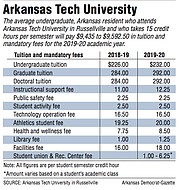Arkansas Tech University students will pay more next year to attend, after a board of trustees vote that raised tuition and fees for the Russellville and Ozark campuses.
The increase is driven largely by a rise in mandatory fees, including a new fee approved by Arkansas Tech's Student Government Association for a student union and recreation center. Tuition also will rise as the university plans to spend more on faculty and staff salaries.
The cost of attending for an in-state undergraduate taking 15 credit hours per semester at the Russellville campus will be $9,435 to $9,592.50, depending on the student's academic classification, up from $9,067.50 this school year. That's a jump of about 4% to 5.8%.
Out-of-state students will pay twice that amount if they do not have a tuition waiver.
The increases are necessary for maintaining the school's priorities, outlined in the budget, university President Robin Bowen said in a news release.
"As a result, we prepare to enter a new fiscal year with a balanced budget that will allow us to continue investing in students in a manner consistent with our strategic plan," Bowen said in the release.
Arkansas Tech enrolled 12,071 students in the fall, making it the third-largest university in the state. Factoring out its state-leading 3,172 high school students, it's the fourth-largest university in the state, with 7,949 undergraduates and 950 graduate students.
The cost approved Thursday is more than the $9,188 approved last week by University of Central Arkansas trustees in the first of several state university system votes to approve budgets and the prices of tuition, fees, room and meals.
Henderson State University trustees meet today, and University of Arkansas System trustees meet next week in Little Rock. They'll be followed by trustees meetings for Southern Arkansas University and Arkansas State University.
Last year, at the request of Gov. Asa Hutchinson, Arkansas' public universities did not raise tuition. Instead, they raised only fees. Annual tuition increases, long blamed on stagnant state funding that doesn't keep up with inflation and other needs, had been standard in Arkansas for years before last year's freeze.
Public colleges and universities nationwide are increasingly reliant on tuition and fee revenue to support and expand their operations. Meanwhile, colleges battle one another for new students and stare down long-term reductions in high school graduates.
The increased tuition and fees have helped create student-loan debt that now totals more than $1.5 trillion nationwide and is often blamed, along with stagnant wages and cultural changes, for declines in homeownership and birthrates.
The cost of college is gaining more attention among Democratic presidential candidates, who have called for varying levels of free tuition programs and even the canceling of most borrowers' current debt.
Arkansas Tech's tuition and fee increases coincide with a 3% budget increase to $173 million from $168 million. That increase is in part because of 1% across-the-board salary increases, promotion and tenure adjustments and an increase in the state's minimum wage, Bowen wrote in a letter to trustees.
The employee raises are necessary to compete against other schools to "recruit and retain high-quality employees" who can help students succeed and fulfill the school's strategic plan, university spokesman Samuel Strasner said.
"Offering competitive compensation and benefit packages is part of competing in that marketplace," Strasner said.
Tuition per undergraduate credit hour at the Russellville campus will rise from $226 to $232, a 2.7% increase. Graduate and doctoral tuition will climb 2.8%, from $284 per credit hour to $292.
Total mandatory fees at the Russellville campus will rise from $76.25 per credit hour to a range of $82.25 to $87.50, a 7.9% to 13.4% increase.
The university raised fees for athletics, health and wellness, library and facilities. It left the instructional support, public safety, student activity and technology operations fees the same.
The facilities fee increased the most, by 12.5% from $16 to $18, as the university embarks on the construction of a student union and recreation center. The university is also renovating the physical education building to be a multipurpose space.
Student feedback during the most recent campus master planning process showed that a student union and recreation center are among the university's "greatest needs," Strasner said. When it opens, it will become the "heartbeat" of the campus and better connect students, help recruit and retain students and host more evening and weekend student activities, he said.
The school currently has a student union and recreation center fee to help pay for the facilities, the cost of which ranges from $1 per credit hour to $6.25 per credit hour, depending on a student's status. Freshmen will pay $6.25 per credit hour, sophomores will pay $5, juniors will pay $3 and seniors and graduate students will pay $1.
Ozark campus, concurrent and online students will not have to pay the public safety, student activity or the student union and recreation fee.
Meal plans also will rise 3.8%, from $1,589 in a year to $1,649, for students who have unlimited plans and a declining cash balance of $100. About 32% of Arkansas Tech students have that plan. All meal plans will increase by less than 4%.
At the Ozark campus, the university's two-year satellite campus, tuition will go up from $125 per credit hour to $129 per credit hour. Ozark students also will pay a higher infrastructure fee next school year of $12 per credit hour, up from $10 this year.
Metro on 05/17/2019

